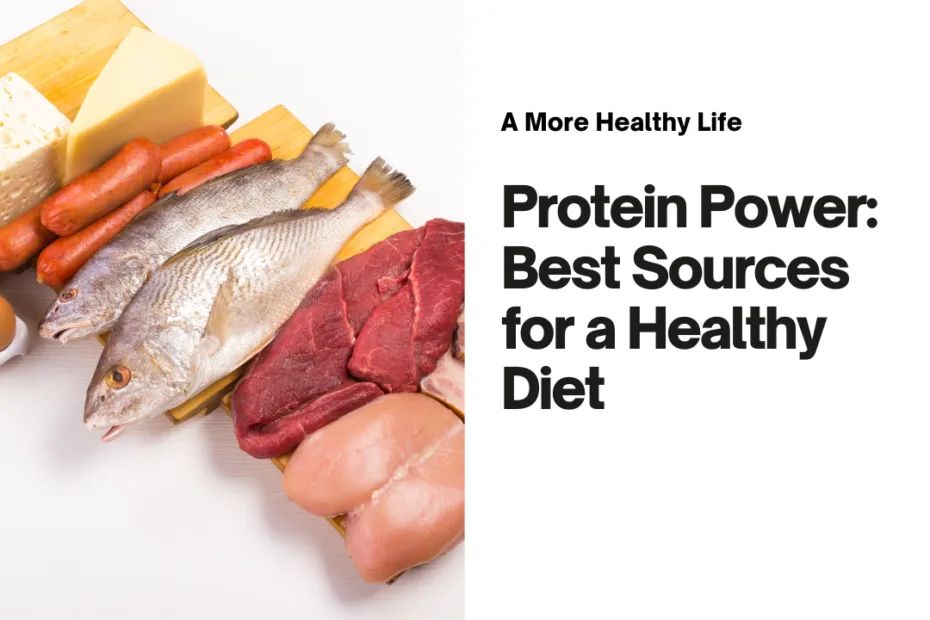Protein Power: Best Sources for a Healthy Diet
Protein is a vital nutrient that plays an essential role in almost every biological process in the human body. It’s the building block of muscles, skin, enzymes, and hormones, and it helps repair tissues and build new cells. Incorporating the right amount of protein into your daily diet is essential for maintaining overall health, supporting muscle growth, and managing weight. However, not all protein sources are created equal, and finding the best options for your body can help you optimize your nutritional intake.
Understanding Protein and Its Importance
Proteins are made up of amino acids, often called the “building blocks” of life. There are 20 amino acids in total, nine of which are considered essential because the body cannot produce them on its own, and they must be obtained through diet. The amount of protein each person needs depends on several factors, including age, activity level, and health goals. The Recommended Dietary Allowance (RDA) suggests an intake of about 0.8 grams of protein per kilogram of body weight for the average adult. Protein needs may be higher for those who are more active or looking to build muscle.
Animal-Based Protein Sources
When it comes to high-quality protein, animal-based sources are often regarded as the best because they provide all nine essential amino acids in sufficient quantities.
- Eggs
Eggs are considered one of the best protein sources due to their high biological value. They are a complete protein source containing all the essential amino acids. One large egg provides approximately 6 grams of protein. Eggs are also rich in other vital nutrients like vitamin B12, selenium, and choline, which are essential for brain health.
- Chicken Breast
Chicken, especially the breast, is a lean source of protein, making it an excellent choice for those looking to boost their intake without consuming excess fat. A 3-ounce (85-gram) serving of chicken breast provides about 26 grams of protein, making it a powerhouse for muscle repair and growth. It’s also versatile in cooking and can be included in various dishes.
- Fish
Fish, particularly fatty fish like salmon, tuna, and mackerel, are high in protein and rich in omega-3 fatty acids, which are beneficial for heart health. A 3-ounce (85-gram) serving of cooked salmon provides about 22 grams of protein. Additionally, fish is an excellent source of vitamin D, which is essential for bone health.
- Greek Yogurt
Greek yogurt is an excellent dairy-based protein option. It’s higher in protein than regular yogurt due to the straining process, which removes excess liquid and lactose. A 170-gram serving of plain Greek yogurt contains around 10-20 grams of protein, depending on the brand and fat content. It also provides probiotics, which are beneficial for gut health.
Plant-Based Protein Sources
For those who follow a vegetarian or vegan diet or for anyone looking to reduce their consumption of animal products, there are plenty of plant-based protein sources that can provide adequate nutrition.
- Lentils
Lentils are an excellent source of plant-based protein, offering around 18 grams of protein per cooked cup (198 grams). They are also rich in fiber, which aids in digestion and helps to keep you feeling full longer. Lentils are versatile and can be used in soups, salads, or as a meat substitute in various dishes.
- Chickpeas
Chickpeas (garbanzo beans) are another great plant-based protein option, providing approximately 15 grams of protein per cooked cup (164 grams). They are also high in fiber and offer a range of essential vitamins and minerals, including iron, magnesium, and folate. Chickpeas can be roasted for a crunchy snack, blended into hummus, or added to salads and stews.
- Quinoa
Quinoa is unique among plant-based foods because it is a complete protein containing all nine essential amino acids. One cooked cup (185 grams) of quinoa provides around 8 grams of protein. In addition to protein, quinoa is a good source of magnesium, iron, and fiber. It is gluten-free and can be used as a base for salads or a substitute for rice in various dishes.
- Tofu
Tofu, made from soybeans, is one of the most popular plant-based protein sources. A 3.5-ounce (100-gram) serving of tofu contains about 8 grams of protein. Tofu is also rich in calcium and iron, making it a valuable addition to vegan and vegetarian diets. It’s highly versatile and can be used in savory and sweet dishes.
Conclusion
Incorporating a variety of protein sources, whether animal- or plant-based, into your diet is crucial for maintaining optimal health. Each source offers different benefits, from providing all essential amino acids to contributing other nutrients like omega-3 fatty acids, fiber, and vitamins. Balancing your protein intake with a wide range of foods can support muscle growth, boost your energy levels, and promote overall well-being.
Bibliography
- Harvard T.H. Chan School of Public Health. “Protein.” The Nutrition Source. Accessed October 10, 2024. https://www.hsph.harvard.edu/nutritionsource/what-should-you-eat/protein/.
- U.S. Department of Agriculture. “FoodData Central.” USDA. Accessed October 10, 2024. https://fdc.nal.usda.gov/.
- Mayo Clinic Staff. “How much protein do you need every day?” Mayo Clinic. Accessed October 10, 2024. https://www.mayoclinic.org/healthy-lifestyle/nutrition-and-healthy-eating/expert-answers/how-much-protein/faq-20058231.

Awesome site you have here but I was curious about if you knew of any community forums that cover the same topics discussed here? I’d really love to be a part of online community where I can get suggestions from other knowledgeable individuals that share the same interest. If you have any recommendations, please let me know. Kudos!
Comments are closed.